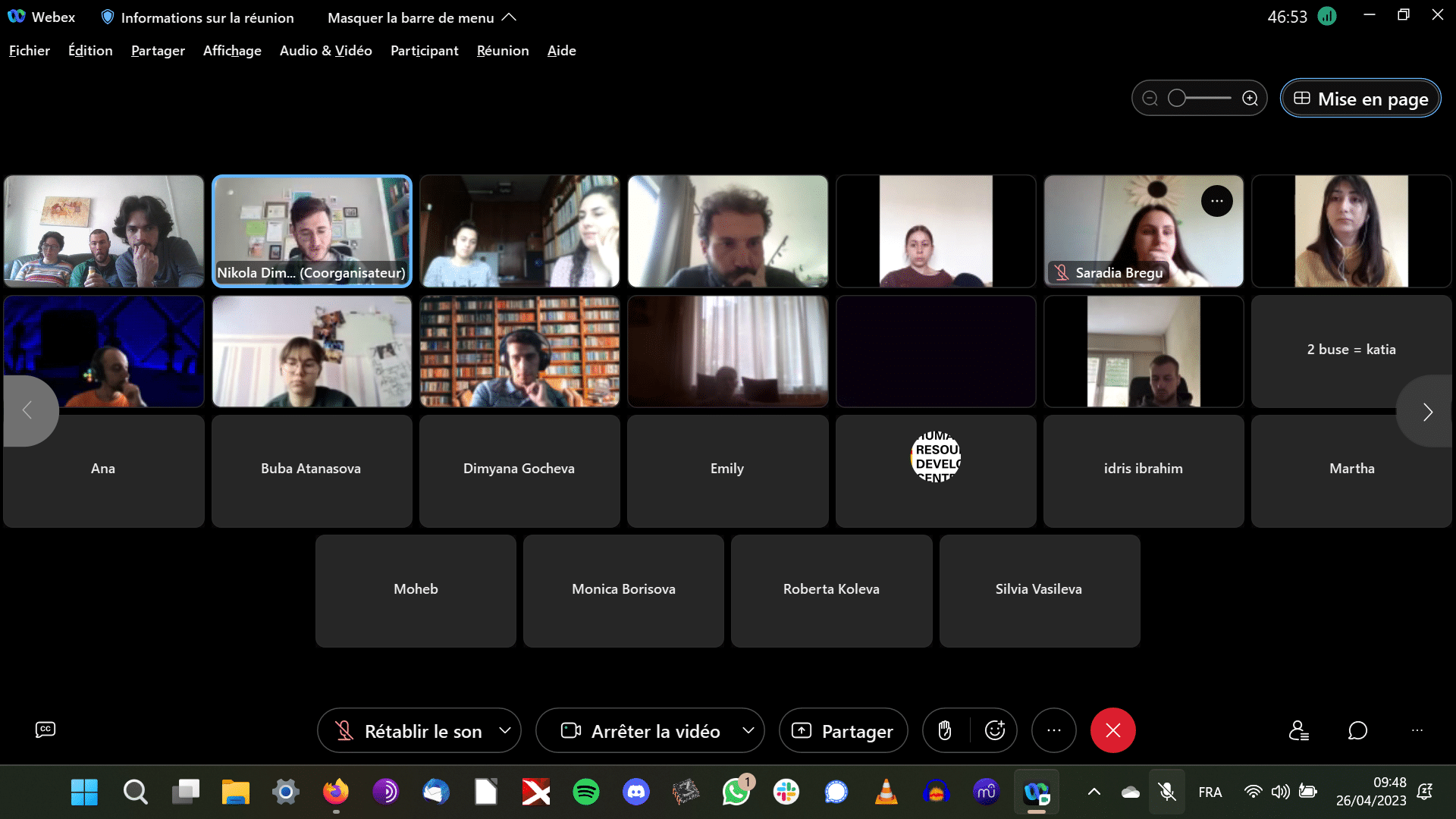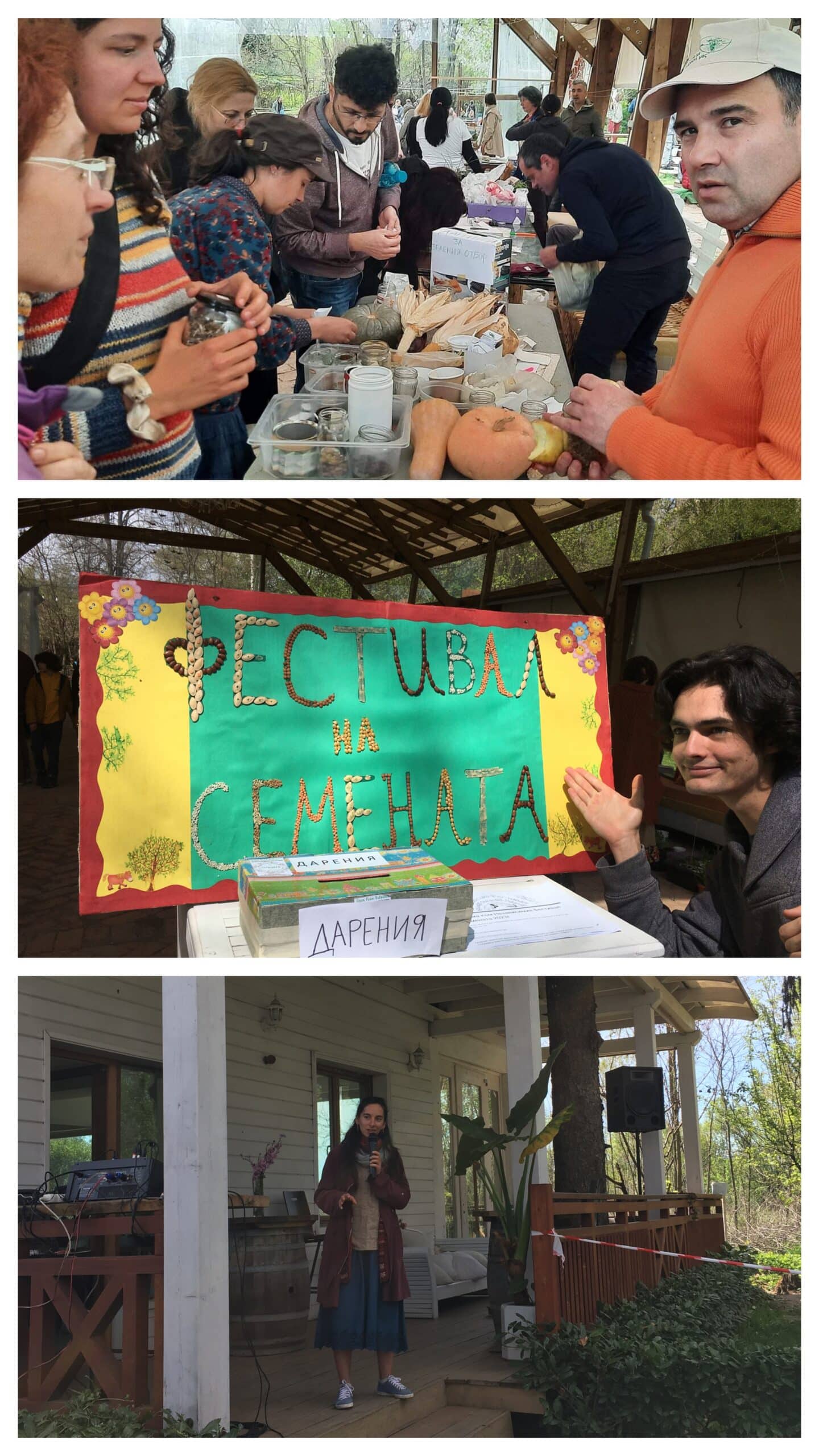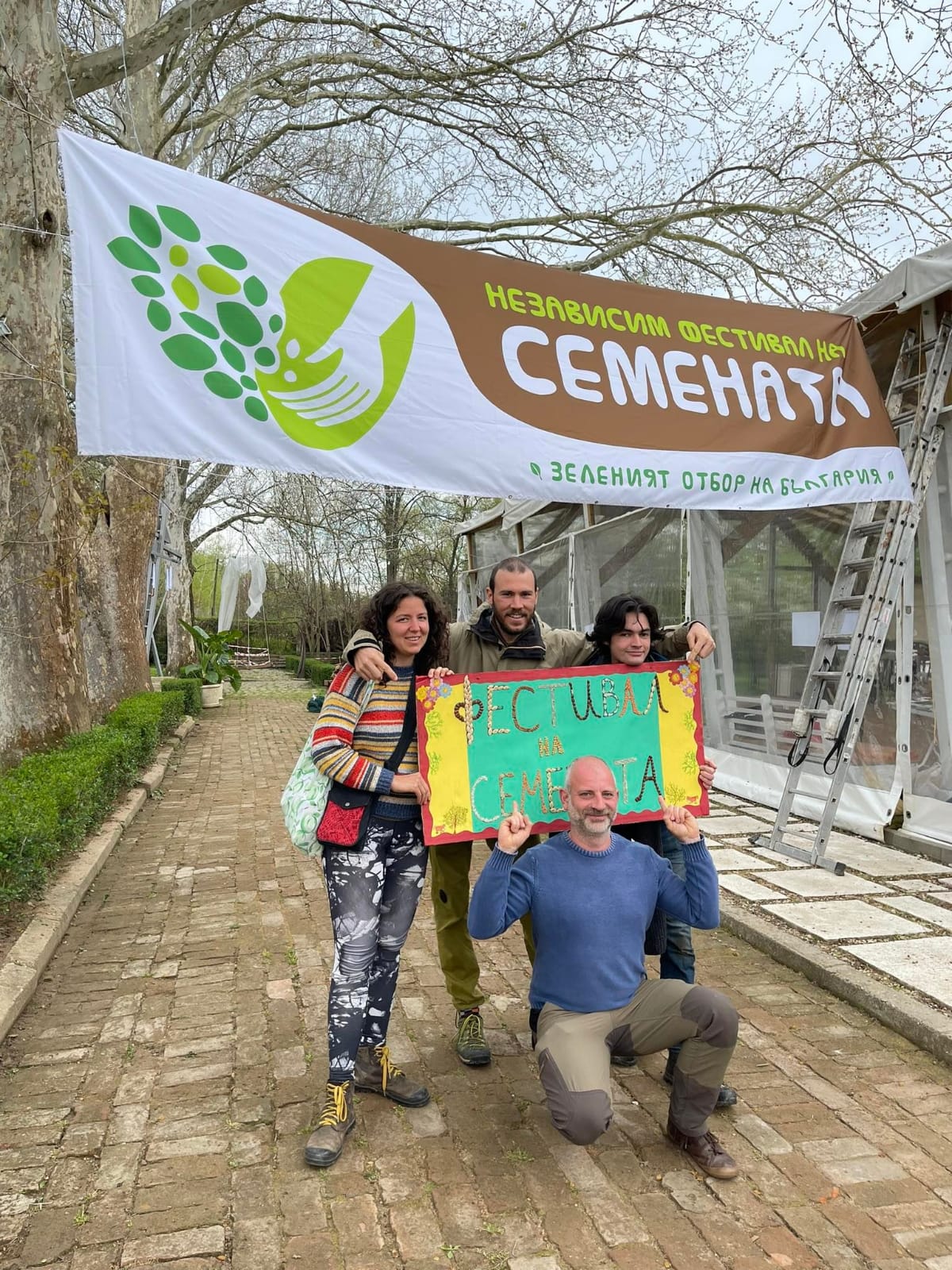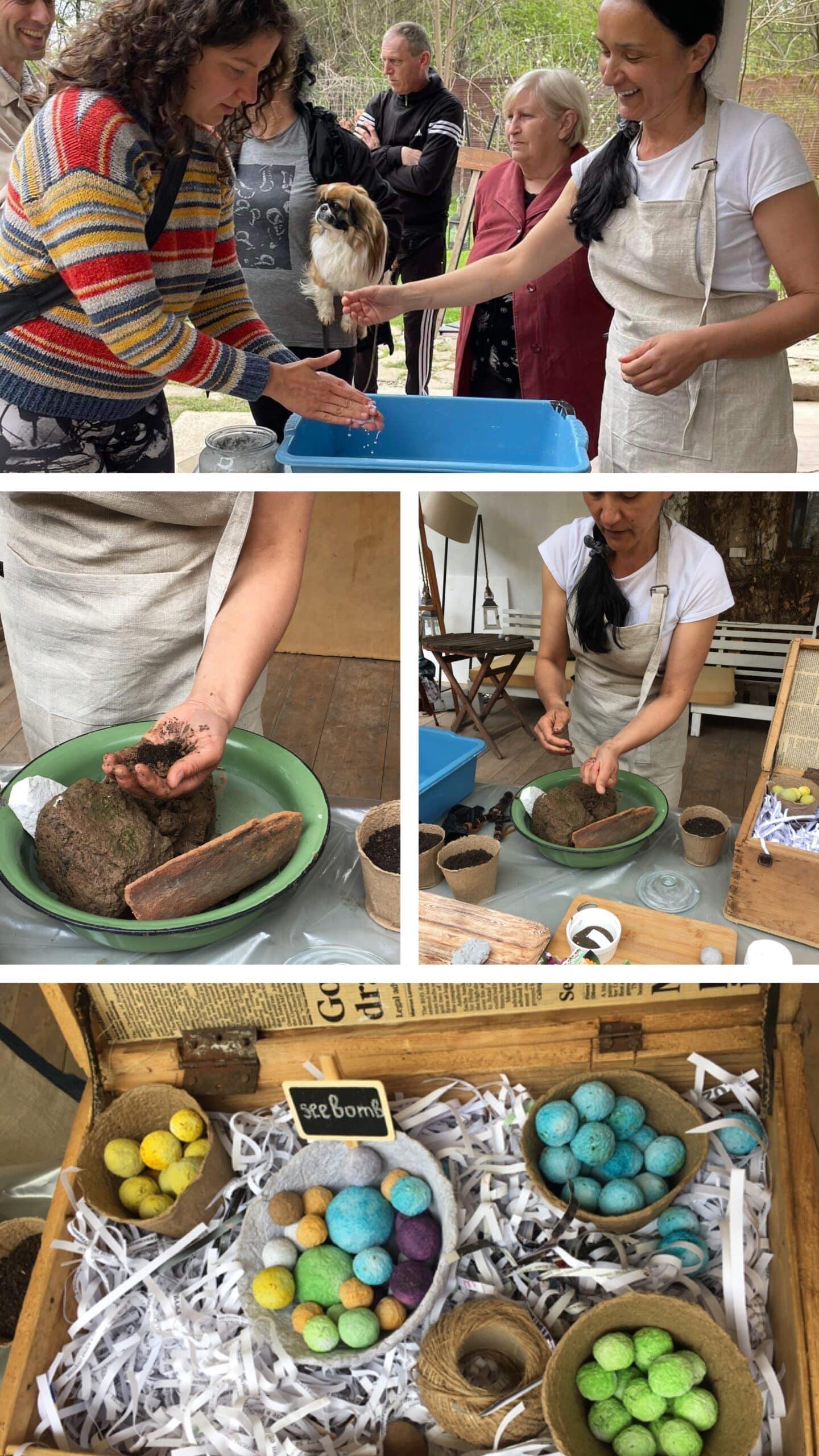François
Hi everyone!
This week we’ve been busy with something very special, under the form of an online “midterm evaluation” provided by the National Agency of the European Solidarity Corps. It was a 4-days long program, 7 hours a day, dedicated to help us reflect about our experience as volunteers in Bulgaria and think about the future of our projects and lives. To do so, we were with about 20 other volunteers (Bulgarian and foreigners), under the supervision of two teachers: Nikola Dimov and Atanas Genkov.

The course was intense, and we had a lot of different topics covered. We spent a lot of time sharing about our projects: what we were expecting, what we were doing, the issues we were facing. Then we tried to find solutions to one another to fix potential problems, and we discussed tools we could implement to make things better, such as non-violent communication, habits implementation, project management, etc. We also played a lot of games to introduce and then better understand the concepts the teacher wanted to explain. Here is an example:
We were told to throw paper balls in glasses, and separated in two groups in different virtual rooms. One of the groups was given a lot of encouragements, and were also told that it was only a game and that they should have fun; the other one, on the contrary, was told that it was a tournament, that the goal was to score 10, and that time was limited. It turned out that the first group scored a lot better, and thus we were able to discuss the importance of a good team management, as well as the problems with fixing goals instead of working with habits.
After all, and even though we were disappointed that the meetings were held online, we were happy to meet new people (with which we hope to stay in contact!), to discover other projects, to help and to be helped, and to learn!
See you next week!
Anastasja
Hello fellow gardening enthusiasts,
Last weekend was AGAIN a long weekend because of labor day, and the Todorovo trio (Francois, Peter, and I) took the opportunity to go on a spontaneous trip to Elin Pelin for the Seed Festival – Фестивал на Семената! We were accompanied by our project coordinator Mihaela and her partner Philip which gave us the chance to meet and talk to some of the organizers and other interesting figures in the Bulgarian environmentalist scene. This year’s Seed Festival was already the 11th edition, organized by the Greenteam of Bulgaria (Зеленият Отбор на България – https://greenteambg.com/bg/). The Greenteam is a group of volunteers which gave themselves the mission to collect, grow, and store seeds from all over Bulgaria, and to eventually share them with others, so that precious old varieties won’t get lost. During the festival the Greenteam was doing exactly this, giving out seeds and exchanging them with all the passionate gardeners that came to the festival. They were joined by other farmers who set up stands to share their own seeds. Among the sharers was also a group from Greece, Peliti (Home – PELITI), who are the organizers of the Greek seed festival which inspired the Bulgarian one (already in its 23rd edition this year). We were lucky to meet Peliti’s founder, Panagiotis Sainatoudis, a passionate seed collector who was honored as “Guardian of Mediterranean Biodiversity” by Bioversity International for his dedication to collecting thousands of seeds all over the Mediterranean.

Simultaneous to the seed-sharing there was also a series of talks and workshops. On Saturday, we arrived in time for the first presentation of the festival, given by Madlen Zasheva, about composting. In her talk, Madlen compared urban and rural composting, trying to motivate people who are living in cities to compost too, even though it might seem more complicated in their circumstances. She explained that people in cities are often afraid of composting because they are scared of bad smells and attracting rats. However, if done correctly, in an appropriate container, all of this can be avoided, and the neighbors remain undisturbed. A few things that have to be considered when composting in a container:
- The compost has to be turned more often because there might not be helpful worms, insects, and microorganisms to help turn the compost
- However, Madlen thinks that one should also not be afraid of trying Californian red worms and creating a vermicompost in their city home-compost
- Also, the moisture should be checked often, and water added as needed
In general, her message was that we should be brave and experiment. With time, we will understand the composting process better, and make better compost. Like this, we can track our own consumption, waste less, and create more fertile soil for our plants.
Another highlight was a talk by Natasha Marinova about gardening without irrigation. Yes, you read correctly, no watering! Or at least, only watering once. According to the method she presented, you should water the hole where you are going to plant your seedling a lot before planting, then mulch intensively. After that, the plant will grow deeper roots and find its own way to the water channels, while the mulch will retain the rainwater. Natasha told us about her tomato plants, that grew roots three meters deep into the soil! Later our host Catherine from Venets, told us that they actually planted tomatoes like this last year. Even though they planted them quite late in the season, so they did not catch too many spring rains, the tomatoes still grew and survived. This year, we will soon try this ourselves with a few tomato seedlings. Stay tuned for the results!
On Sunday, among other things, we joined a workshop on seed-bombs/seed-balls for Guerrilla gardeners. These seed-bombs were inspired by Masanobu Fukuoka’s way of sowing rice (I recommend his book The one-straw revolution for anyone who hasn’t read it yet). Fukuoka made seed-balls of rice wrapped in clay to sow rice in between his cover-crops without risking that animals and birds will eat them. Nowadays, so-called guerrilla-gardeners use seed-balls/-bombs to quickly sow seeds in in sites where they are not legally allowed to sow (public spaces, abandoned sites, private property,…). We tried making some seed-balls ourselves with cellulose (shredded paper mixed with water), as well as clay which we inoculated with some compost to give the seeds extra nutrients.
UP: Anastasja making seed-bombs (photo credit: Mihaela Tsarchinska). MIDDLE: The process of making seed-bombs. DOWN: Beautiful colored seed-bombs (photo credit: Anastasja Giacomuzzi).
Overall it was a wonderful experience, and we got to collect many seeds for Venets’ seed library. Check out if you have a seed festival near your home, maybe you can help propagate some old and well-adapted varieties.
Happy seed-sharing,
Anastasja



